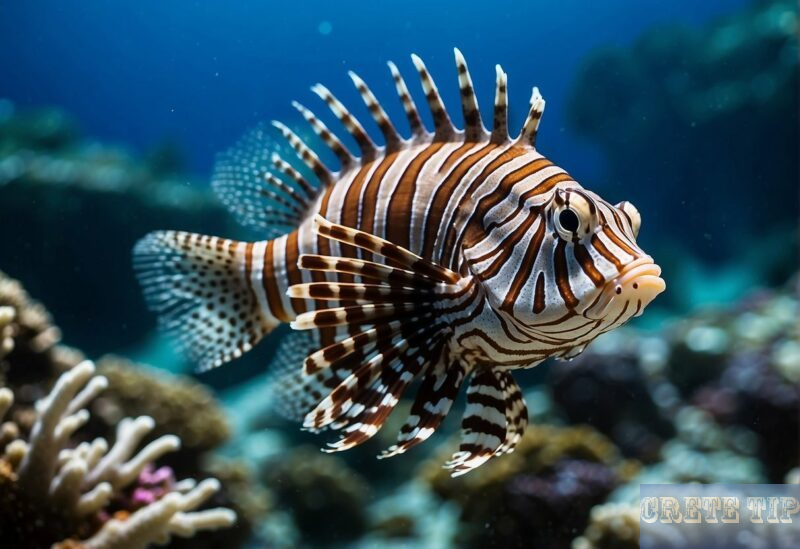Lionfish conquer the Mediterranean: an invasive advance.

Pervasive invasion: the advance of lionfish in the Mediterranean
The Mediterranean is undergoing a remarkable change in its species composition with the presence of the lionfish, a spectacularly striped and spiny species known for its tropical habitats of origin.
This fish species, in particular the Indian lionfish (Pterois miles), now also belongs to the warmer waters of the Mediterranean.
Impressively adaptive and identified as aggressive invaders, these fish are spreading there, with far-reaching consequences:
Ecosystem impacts:
– Habitat changes: Establishment in different marine environments
– Threat to native species: Uncontrolled reproduction and predation.
Issues:
– Ecological balance: Potential destabilization due to pressure from these predators.
– Species conservation: Risk for endemic fish species that lack natural flight instincts.
Researchers at Wageningen University in the Netherlands have carefully studied the distribution of the species and found that their adaptive behaviour allows them to seamlessly adjust to the new conditions of the Mediterranean and thrive there.
Their inconspicuous hunting style further contributes to their ability to surprise and consume native and unique species unnoticed.
Propagation mechanisms:
– Reproduction: production of numerous eggs.
– Migratory movements: Expansion of their habitat over wider marine regions.
The Indian lionfish Pterois miles

The Indian lionfish, scientifically known as Pterois miles, is also commonly referred to as the devil firefish or common lionfish. This species is a ray-finned fish native to the western Indo-Pacific region, including areas such as southern Japan, Micronesia, Australia, and the Philippines.
Pterois miles belongs to the family Scorpaenidae, which includes scorpionfishes. It is known for its striking appearance, featuring dark red to dark brown bands with white interspaces, often bisected by thin dark bands. The fish also has distinctive white tassels at the tips of its dorsal spines and on its lower jaw.
In recent years, the Indian lionfish has gained notoriety as an invasive species in the western Atlantic Ocean and the Caribbean Sea. Its successful colonization of these non-native habitats has raised concerns about its impact on local ecosystems.
It’s worth noting that Pterois miles is often confused with its close relative, Pterois volitans (red lionfish). Both species are sometimes collectively referred to as lionfish in discussions about their invasive impact and management efforts.
Threat to the local ecosystem
Mediterranean regions are experiencing an increasing presence of lionfish, which originally come from the Red Sea. Researchers blame the Suez Canal for the spread of this invasive species.
These fish are particularly known for their long, spiny dorsal fin and striking striped pattern and are often kept in aquariums due to their exotic appearance.
Despite their popularity with aquarium owners, they pose a serious threat to native marine life, especially smaller fish and crustaceans.
Lionfish are known to consume enormous quantities of local species, with their digestive systems capable of enormous expansion. The impact of these predators on the ecosystem is worrying; in the Bahamas, for example, an increase in the lionfish population has been found to correlate with a significant decline in prey species.
The role of local marine biologists and conservation organizations such as WWF is to issue warnings and develop strategies to control the spread of these predators. These organizations emphasize the importance of protecting the biodiversity of coral reefs, as they form the basis for a healthy marine ecosystem.
Painful stitches

A lionfish sting can have extremely painful consequences. Its dorsal fins contain venomous spines whose toxin is comparable to that of cobra venom.
When touched, the spines can immediately cause burning pain. Later on, these can lead to considerable swelling in the affected area. Although fatalities are rare, in serious cases breathing difficulties, circulatory collapse or even fainting can occur.
Increasing sightings in the Mediterranean:
– Eastern Mediterranean: First documented occurrence as early as 1991 off the coast of Israel.
– Expansion: Increased sightings off Lebanon, Turkey, Cyprus, Greece and Italy since 2012.
– Invasive species: Recognized as such since 2016.
– New habitats: Also in colder waters previously considered unsuitable.
The population development of the lionfish shows a clear spread beyond traditional habitats. According to current studies, sightings by locals and tourists play an important role in recording their distribution.
Their observations and reports provide crucial data for research. The full extent of the impact on the Mediterranean ecosystem has not yet been recorded, but there is a consensus on the urgency of long-term studies of fish populations in order to close this knowledge gap.



